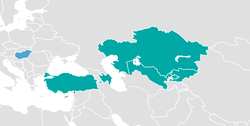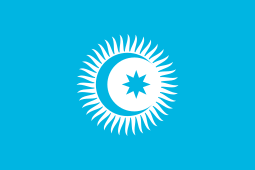Turkic Council
The Turkic Council, officially the Cooperation Council of Turkic-Speaking States, is an international organization comprising some of the Turkic countries. It is an intergovernmental organization whose overarching aim is promoting comprehensive cooperation among Turkic states. It was founded on 3 October 2009 in Nakhchivan. The idea of setting up this cooperative council was first put forward by Kazakh President Nursultan Nazarbayev back in 2006.
Cooperation Council of Turkic-Speaking States (Turkic Council)
| |
|---|---|
 Emblem
| |
 Members Observer States | |
| Headquarters | |
| Official languages[3] | |
| Membership[4] | |
| Leaders | |
• Secretary-General | |
• Honorary President | |
| Establishment | 3 October 2009 |
| Area | |
• Total | 4,242,362 km2 (1,637,985 sq mi) |
Website turkkon.org/ | |
| |
The General Secretariat is in Istanbul, Turkey. The member countries are Azerbaijan, Kazakhstan, Kyrgyzstan, Turkey and Uzbekistan. Turkmenistan is currently not an official member of the council due to its neutral stance. However, by default of its Turkic heritage, it is a possible future member of the council.[5] Uzbekistan announced its intention to join the council on 30 April 2018,[6] and formally applied for membership on September 12, 2019.[7] Since late 2018, Hungary is an observer and may soon request full membership in the Turkic Council.[8]
History
The organization was established on October 3, 2009 by the Nakhchivan Agreement signed among Azerbaijan, Kazakhstan, Kyrgyzstan, and Turkey. According to Halil Akıncı, the founding Secretary-General of the organization the "Turkic Council has become the first voluntary alliance of Turkic states in history".
In 2012, the flag of the Turkic Council was adopted.
In late April 2018, it was announced that Uzbekistan is going to join the Turkic Council and attend the upcoming summit of the organisation in Bishkek.[9]
Mission and objectives
The Preamble of the Nakhchivan Agreement reaffirms the will of Member States to adhere to the purposes and principles enshrined in the Charter of the United Nations, and defines the main objective of the Turkic Council as further deepening comprehensive cooperation among Turkic Speaking States, as well as making joint contributions to peace and stability in the region and in the world. Member States have confirmed their commitment to democratic values, human rights, the rule of law, and principles of good governance.
The Nakhchivan Agreement sets out the main purposes and tasks of the Organization as follows:
- Strengthening mutual confidence and friendship among the Parties;
- Developing common positions on foreign policy issues;
- Coordinating actions to combat international terrorism, separatism, extremism and cross-border crimes;
- Promoting effective regional and bilateral cooperation in all areas of common interest;
- Creating favorable conditions for trade and investment;
- Aiming for comprehensive and balanced economic growth, social and cultural development;
- Expanding interaction in the fields of science, technology, education, health, culture, sports and tourism;
- Encouraging interaction of mass media and other means of communication;
- Promoting exchange of relevant legal information and enhancing legal cooperation.
Structure and operation
Main organs of the Turkic Council include:
- Council of Heads of State
- Council of Foreign Ministers
- Senior Officials Committee
- Council of Elders (Aksakals)
- The Secretariat
The main decision-making and governing body of the Turkic Council is the Council of Heads of State, which is presided over by the President whose country holds the chairmanship. The chairmanship rotates on an annual basis. All activities of the Turkic Council are coordinated and monitored by its Secretariat, which is located in Istanbul in accordance with the Nakchivan Agreement. Presidents meet once a year in a previously determined Turkic city. Senior officials, Aksakals, as well as other Ministers and government officials, all meet on a regular basis.
Projects
Since its founding agreement defines comprehensive cooperation among Turkic states as the organization's main objective and raison d'être, the Turkic Council is working on a whole variety of projects. The projects are grouped under six cooperation processes, which are: economy, culture, education, transport, customs, and diaspora. Examples of the projects include establishing the Turkic University Union[10] and writing a common history textbook. The Turkic Council also works on ways to boost economic development in underdeveloped regions of Member States. The Secretariat brings together Economy Ministers, Education Ministers, Transport Ministers, Heads of Customs Administrations, and other senior officials from different ministries and agencies in order to work on ways to promote cooperation in relevant spheres. Prior to being brought before ministers and heads of administrations, projects and issues of cooperation are elaborated by working groups. One recently launched project is the establishment of a mechanism for closer cooperation among Turkic diasporas all over the world.
Affiliated bodies and organizations

The Turkic Council functions as an umbrella organization for all other cooperation mechanisms like:
- the Parliamentary Assembly of the Turkic Speaking Countries (TURKPA) (administrative capital, Baku)
- the International Organization of Turkic Culture (TURKSOY) (administrative capital, Ankara)
- International Turkic Academy (administrative capital, Astana)
- Turkic Cultural Heritage Fund
- Center of Nomadic Civilizations (administrative capital, Bishkek)
- Turkic Business Council (administrative capital, İstanbul)
Flag
The current flag of the Turkic Council was adopted at its 2nd Summit, which took place in Bishkek on 23 August 2012 and officially raised on 12 October 2012.[11] The flag combines the symbols of the four founding member states: the light blue color of the flag of Kazakhstan which also reminds the Turkic color of turquoise, the sun of the flag of Kyrgyzstan, the star of the flag of Azerbaijan and the crescent of the Turkish flag.
Summits

Following the dissolution of the Soviet Union, the newly independent Turkic States of Azerbaijan, Kazakhstan, Kyrgyzstan, Turkmenistan and Uzbekistan as well as Turkey organized Summits of the Heads of Turkic Speaking States, the first of which took place in 1992 in Ankara. With the establishment of Turkic Council, at the 10th Summit it was decided to rename the top-level meetings to Turkic Council Summits.
Turkic Council Summit is the highlight of the year whereby Heads of State evaluate outcomes of the past period and set goals for the next year. The First Summit took place in Almaty, Kazakhstan, on 20–21 October 2011 and focused primarily on economic cooperation. The Second Summit was held in Bishkek, Kyrgyzstan, on 22–23 August 2012 and concentrated on educational, scientific, and cultural cooperation. The Third Summit took place on 15–16 August 2013 in Qabala, Azerbaijan with a theme of transport and connectivity.[12]
On October 15, 2019, the Seventh Turkic Council Summit was organized in Baku with the participation of Presidents of member states Ilham Aliyev, Sooronbai Jeenbekov, Recep Tayyip Erdoğan, Shavkat Mirziyoyev, as well as Purli Agamyradov as a guest, Viktor Orban as an observer and heads of Turkic cooperation institutions. The participants celebrated the 10th anniversary of the Nakhchivan Agreement on the establishment of the Turkic Council in addition to Uzbekistan’s joining the organization as a full-fledged member. The title of Honorary Chairman of the Turkic Council was given to the former President of Kazakhstan Nursultan Nazarbayev. In the conclusion of the Summit, the Heads of States signed Baku Declaration. Besides, the presidency in the Council officially passed to Azerbaijan.[13][14]
| Meeting | Date(s) | Host country | Location |
|---|---|---|---|
| 1st | 20–21 October 2011 | Almaty | |
| 2nd | 22–23 August 2012 | Bishkek | |
| 3rd | 15–16 August 2013 | Qabala | |
| 4th | 5 June 2014 | Bodrum | |
| 5th | 11 September 2015 | Astana | |
| 6th | 3 September 2018 | Cholpon-Ata | |
| 7th | 15 October 2019 | Baku |
Extraordinary Summit
Extraordinary Summit of Turkic Council focused on the fight against the coronavirus pandemic was conducted through videoconferencing by the initiative of the chairman of the organization Ilham Aliyev on April 10, 2020. The conference titled “Cooperation and solidarity in the fight against the COVID-19 pandemic” was held with the participation of the Director-General of the World Health Organization, Tedros Adhanom Ghebreyesus along with the head of states of the member countries. Participants discussed the measures taken at the national level to fight against the coronavirus epidemic, improve multilateral cooperation in the field of healthcare, and undertake the common challenges caused by the outbreak of COVID-19. Exchanging views on the ways of overcoming negative effects of coronavirus on the national and global economies, they touched upon trade relations and continuous transportation and entrusted the Ministries of Commerce and Transport of the member States to review the process via videoconferencing and present practical solutions for the free flow of goods among Turkic Council states across the Trans-Caspian Corridor.[15] [16] An 18-point list of mutual priorities of all member nations was outlined in the Baku Declaration.[17]
International cooperation
Turkic Council is an observer at the Economic Cooperation Organization. The Organization has also applied for an observer status at the United Nations and the Organization of Islamic Cooperation. Besides, Turkic Council maintains close cooperative relations with the Organization for Security and Co-operation in Europe and the Conference on Interaction and Confidence-Building Measures in Asia.
Members
Current
| Country | Population[18][19] (2018) | Area (km2) | GDP (nominal) 2019[20] | GDP per capita (nominal) 2019[21] |
|---|---|---|---|---|
| 9,949,537 | 86,600 | $48 billion | $4,794 | |
| 18,319,618 | 2,724,900 | $180 billion | $9,731 | |
| 6,304,030 | 199,900 | $8.5 billion | $1,309 | |
| 82,340,088 | 783,562 | $754.5 billion | $9,042 | |
| 32,476,244 | 447,400 | $58 billion | $1,725 | |
| 144,074,862 | 4,242,362 | $1049 billion | $8,966 |
Observer states
| Country | Population (2018)[18][19] | Area (km2) | GDP (nominal) | GDP per capita (nominal) (2019)[22] |
|---|---|---|---|---|
| 9,707,499 | 90,030 | $161 billion | $16,475 | |
Possible future member
| Country | Population (2018)[18][19] | Area (km2) | GDP (nominal) | GDP per capita (nominal) (2019)[24] |
|---|---|---|---|---|
| 5,850,901 | 491,210 | $40 billion | $6,966 | |
Land and Water Area (Exclude Caspian Sea)
EEZ+TIA is exclusive economic zone (EEZ) plus total internal area (TIA) which includes land and internal waters.
| Rank | Country | Area | EEZ | Shelf | EEZ+TIA |
|---|---|---|---|---|---|
| 1 | 783,562 | 261,654 | 56,093 | 1,045,216 | |
| 2 | 447,400 | 0 | 0 | 447,400 | |
| 3 | 2,724,900 | 0 | 0 | 2,724,900 | |
| 4 | 86,600 | 0 | 0 | 86,600 | |
| 5 | 199,900 | 0 | 0 | 199,900 | |
| 6 | 488,100 | 0 | 0 | 488,100 | |
| Total | 4,730,462 | 261,654 | 56,093 | 4,992,116 | |
Events
| October 30, 1992 | Turkey | Ankara | First Turkic Speaking States Summit |
| July 12, 1993 | Kazakhstan | Almaty | the Almaty Agreement for founding TURKSOY |
| October 18, 1994 | Turkey | Istanbul | Second Turkic Speaking States Summit |
| August 28, 1995 | Kyrgyzstan | Bishkek | Third Summit |
| October 21, 1996 | Uzbekistan | Tashkent | Fourth Summit |
| June 9, 1998 | Kazakhstan | Astana | Fifth Summit |
| April 8, 2000 | Azerbaijan | Baku | Sixth Summit |
| April 26, 2001 | Turkey | Istanbul | Seventh Summit |
| November 17, 2006 | Turkey | Antalya | Eighth Summit |
| November 21, 2008 | Turkey | Istanbul | the Istanbul Agreement for founding TURKPA |
| October 3, 2009 | Azerbaijan | Nakhchivan | Ninth Summit, the Nakhchivan Agreement for founding the Turkic Council |
| September 15, 2010 | Turkey | Istanbul | Tenth Summit (The end of Non-Corporate Summits of Turkic-Speaking Countries State) |
| October 21, 2011 | Kazakhstan | Almaty | First Turkic Council Summit, Cooperation in Economic Area and Trade Area |
| August 23, 2012 | Kyrgyzstan | Bishkek | Second Turkic Council Summit, Cooperation in Education, Science and Culture[28] |
| August 16, 2013 | Azerbaijan | Qabala | Third Turkic Council Summit, Cooperation in Transportation[29] |
| June 5, 2014 | Turkey | Bodrum | Fourth Turkic Council Summit, Cooperation in Tourism[30] |
| December 24, 2014 | Ukraine | Kiev | Opening of the first Turkic Council Regional Diaspora Center[31] |
| September 11, 2015 | Kazakhstan | Astana | Fifth Turkic Council Summit, Cooperation in Media and Information |
| September 2, 2018 | Kyrgyzstan | Cholpon Ata | Sixth Turkic Council Summit |
| October 15, 2019 | Azerbaijan | Baku | Seventh Turkic Council Summit |
| April 10, 2020 | Teleconference | Extraordinary Video Summit [32] | |
| 2021 | Uzbekistan | Samarkand | Eighth Turkic Council Summit |
List of Secretaries-General of the Turkic Council
| No. | Name | Country of origin | Took office | Left office | Note |
|---|---|---|---|---|---|
| 1 | Halil Akıncı | 3 October 2009 | 16 September 2014 | End of extended term | |
| 2 | Ramil Hasanov | 16 September 2014 | 3 September 2018 | End of extended term | |
| 3 | Baghdad Amreyev | 3 September 2018 | |||
See also
References
- "Türk Konseyi'nden Barış Pınarı Harekatı'na destek". euronews (in Turkish). 2019-10-15. Retrieved 2019-10-26.
- "Türk Konseyi Macaristan ofisi açıldı". www.aa.com.tr. Retrieved 2019-10-26.
- "Turk Dili Konusan Ulkeler Isbirligi Konseyi'nin Kurulmasina Dair Nahcivan Anlasmasi" (PDF). Turkkon.org. Retrieved 2014-03-05.
- "TURKSOY Official Web Site". Turkkon.org. Retrieved 2013-07-07.
- "Turk Dili Konusan Ulkeler Isbirligi Konseyi'nin Kurulmasina Dair Nahcivan Anlasmasi" (PDF). Turkkon.org. Retrieved 2014-03-05.
- "Uzbekistan decides to join 'Turkic alliance' during Erdogan's visit". hurriyetdailynews.com. Retrieved 2018-04-30.
- https://www.rferl.org/a/uzbekistan-officially-applies-for-membership-in-turkic-council/30162275.html
- "Hungary is now part of the assembly of "Turkic Speaking Countries"". Hungarian Free Press. 2018-11-25. Retrieved 2019-06-01.
- "Uzbekistan decides to join 'Turkic alliance' during Erdogan's visit". Hurriyet Daily News. Retrieved 2018-05-01.
- "Turkic University Union". Turkic Council. Retrieved 14 May 2020.
- turkkon.org
- "Third Summit of the Turkic Council Press Release". Turkkon.org. Retrieved 2014-03-05.
- "Seventh Summit of Turkic Council held in Baku". Parliamentary Assembly of Turkic Speaking Countries. Retrieved 2019-10-17.
- "Baku hosted 7th Summit of Cooperation Council of Turkic-Speaking States VIDEO". azertag.az. Retrieved 2019-10-17.
- "Leaders of the Turkic Council held an Extraordinary Summit on 10 April 2020 on Corona Virus Epidemy". Website of the Turkic Council. Retrieved 2020-04-29.
- "Extraordinary Summit of Turkic Council held through videoconferencing on the initiative of President Ilham Aliyev". Official website of President of Azerbaijan. Retrieved 2020-04-29.
- "BAKU DECLARATION OF THE EXTRAORDINARY SUMMIT OF THE COOPERATION COUNCIL OF TURKIC SPEAKING STATES" (PDF). Turkic Council.
- ""World Population prospects – Population division"". population.un.org. United Nations Department of Economic and Social Affairs, Population Division. Retrieved November 9, 2019.
- ""Overall total population" – World Population Prospects: The 2019 Revision" (xslx). population.un.org (custom data acquired via website). United Nations Department of Economic and Social Affairs, Population Division. Retrieved November 9, 2019.
- "GDP (current US$) - Data". Data.worldbank.org. Retrieved 25 August 2017.
- "Report for Selected Countries and Subjects". Imf.org. Retrieved 25 August 2017.
- "GDP (current US$) - Data". Data.worldbank.org. Retrieved 25 August 2017.
- "Press Release of the Sixth Summit of the Turkic Council". Turkic Council. Retrieved 2018-09-04.
- "GDP (current US$) - Data". Data.worldbank.org. Retrieved 25 August 2017.
- "The Turkic world is on the edge of a historic revival". TRT world. Retrieved 2019-10-03.
- "GDP (current US$) - Data". Data.worldbank.org. Retrieved 12 August 2020.
- "Ukraine seeks to obtain observer status in Turkic Council". UKRINFORM. Retrieved 12 August 2020.
- "From Rep. of Turkey Ministry of Foreign Affairs". Republic of Turkey Ministry of Foreign Affairs. Retrieved 25 August 2017.
- "From Rep. of Turkey Ministry of Foreign Affairs". Republic of Turkey Ministry of Foreign Affairs. Archived from the original on 11 November 2014. Retrieved 25 August 2017.
- "From Rep. of Turkey Ministry of Foreign Affairs". Republic of Turkey Ministry of Foreign Affairs. Retrieved 25 August 2017.
- "Türk Dili Konuşan Ülkeler İşbirliği Konseyi". Turkkon.org. Retrieved 25 August 2017.
- "Presidents of the Turkic Council will hold an Extraordinary Video Summit on 10 April 2020 on Corona Virus | News". Türk Keneşi. Retrieved 10 April 2020.
External links
| Wikimedia Commons has media related to Turkic Council. |
